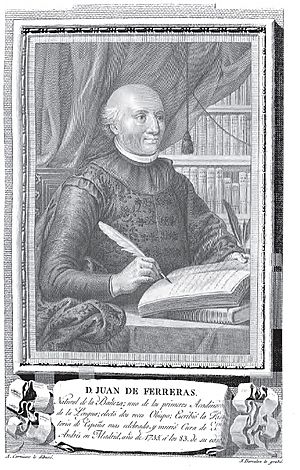Juan Ferreras facts for kids
Quick facts for kids
The Most Excellent
Juan Ferreras
|
|
|---|---|
 |
|
| Born |
Juan de Ferreras y García
1 June 1652 La Bañeza, Spain
|
| Died | 8 June 1735 (aged 83) Madrid, Spain
|
| Seat B of the Real Academia Española | |
| In office 7 July 1713 – 8 June 1735 |
|
| Preceded by | Seat established |
| Succeeded by | Jacinto de Mendoza |
Juan de Ferreras y García was an important Spanish priest. He was born on June 1, 1652, in La Bañeza, Spain. He passed away on June 8, 1735, in Madrid. Juan de Ferreras is famous for being one of the first members of the Royal Spanish Academy. This important group was started in 1713. It works to keep the Spanish language strong and correct.
Contents
Juan Ferreras and Spanish Culture
Juan Ferreras played a big part in the cultural life of Spain. He helped shape how knowledge was shared. He also influenced education during his time.
Working with the Royal Library
The Royal Library was opened to the public in 1712. This was a big step for sharing knowledge. Soon after, the Royal Librarian, Gabriel Alvarez de Toledo, died. There was a lot of pressure from the Jesuits to make Juan de Ferreras the new Royal Librarian.
In 1716, Juan de Ferreras helped create the official rules for using the Royal Library. These rules said that the King's Confessor should be the Director of the Library. This showed how important the library was. It also showed the influence of religious figures.
Changes in Education
In 1717, King Philip V of Spain made some big changes. He closed all the universities in Catalonia. This was because Catalonia had supported the Habsburg family. This happened during the Spanish Succession War.
Instead, a new university was created. It was called the University of Cervera. Many teachers from the old universities moved there. This new university became very influenced by the Jesuits.
Later, in 1727, the Seminario de Nobles was created in Madrid. This school also came under strong Jesuit influence. Around this time, the Royal Library started receiving many new books. It was a rule that the library had to get at least one copy of every book printed in Spain. This meant that a huge amount of information became available. People could learn more than ever before.
See also
 In Spanish: Juan Ferreras para niños
In Spanish: Juan Ferreras para niños
 | Kyle Baker |
 | Joseph Yoakum |
 | Laura Wheeler Waring |
 | Henry Ossawa Tanner |

